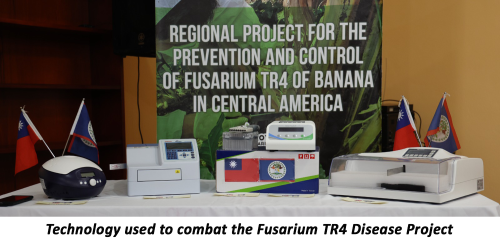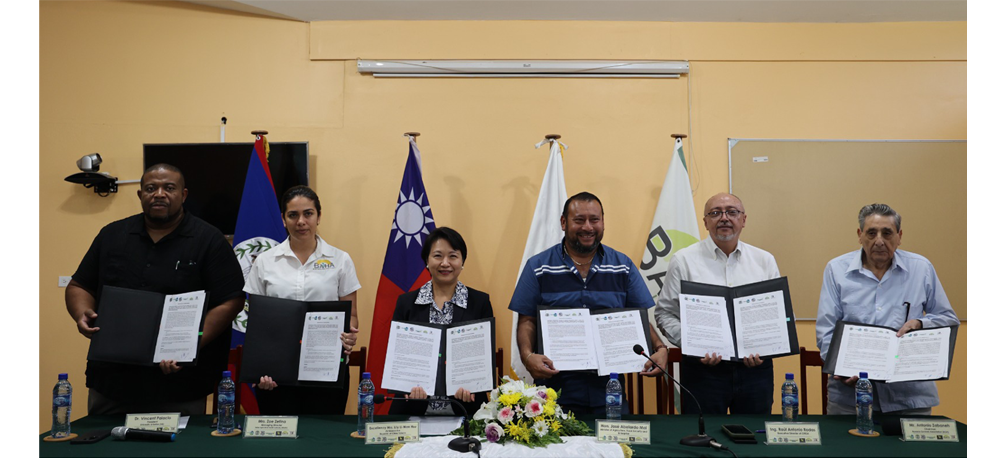Photo: Signatory parties holding signed MoU and Addendums
by Kristen Ku
BELIZE CITY, Tue. July 25, 2023
The Ministry of Agriculture has been on high alert following the announcement, made earlier this month, by the Belize Agricultural Health Authority (BAHA) of the possible presence of Screwworms within the region, particularly Panama and Costa Rica.

After decades of screwworm eradication within Belize, the public was advised via a press release to take precautionary measures when bringing animals across the border.
However, screwworm hasn’t been the only disease that the Ministry is concerned about. Other diseases such as the African Swine Fever in the Dominican Republic and the Fusarium Disease in Colombia, Venezuela, and Peru have raised great concern for Belize, particularly the latter, which affects bananas, which are a huge export product for Belize.
As a result, on Tuesday, July 24, the Minister of Agriculture, in partnership with the International Regional Organization for Health in Agriculture (OIRSA), signed a Memorandum of Understanding (MoU) and addendums under the Fusarium TR4 Disease project.
The signing took place at the Belmopan Showground conference room and in attendance were the 6 signatory parties, which included the Ministry of Agriculture, Food Security and Enterprise (MAFSE); the Belize Agricultural Health Authority (BAHA), the International Regional Organization for Health in Agriculture (OIRSA), the University of Belize (UB), the Banana Growers Association (BGA), and the Republic of China in Taiwan ICDF.
The agreement includes the use of K-9 units for non-intrusive inspection at the Philip Goldson International Airport, as well as the development of tissue culture technology at the University of Belize laboratory for banana and plantain propagation.
Building upon the last agreement signed on April 25, 2022, for implementing these procedures at the PGIA using X-ray machines at the arrival lounge, this move is aimed at promoting more extensive inspection to reduce the risk of pests entering Belize.
“These machines were put in place as a result of the Central American countries coming together saying that [it was] to maintain the area free of disease, free of pests or try to manage the importation of illegal goods that may be contaminated with diseases, viruses or to a great extent, pests,” explained Minister of Agriculture, Hon. Jose Mai on Tuesday.
“All the countries [pledged] that they will place extreme machines to capture any organic products coming in that may not be declared – banana being one of them,” he said.
Mai also discussed how crucial the presence of K-9 units is, as Belize seeks to elevate its level of security at airports, especially as countries in the region are in collaboration for mutual protection.
“If we as a country fail to implement those two actions, then the other countries are saying, ‘You know what, I don’t want to trade with you because you are a risk to me,’” he stated.
Furthermore, another MoU was signed to support the development of tissue culture technology at the UB laboratory for banana and plantain propagation. This innovative technology will aid in propagating resistant varieties of bananas to combat Fusarium TR4 Disease effectively.
The Banana Growers Association is also taking part in the effort, expanding its satellite surveillance program, which employs satellite imagery to detect discolorations in banana plantations. This early detection system will help identify disease introductions, fertilization requirements, or any other issues promptly.
Additionally, the Regional Project on Fusarium TR4 has generously donated state-of-the-art laboratory equipment to BAHA, strengthening their capacity for early disease diagnosis, and ensuring reliable results for informed decision-making.
“In the past we had some resistance that maybe we didn’t need the extreme machines, we didn’t need the K-9 units, but when I explained to the colleagues in Cabinet that if we don’t do this our chances of opening markets to other Central American countries is being restricted, because nobody wants to trade with a country who behaves irresponsibly, [they agreed],” said Minister Mai.
Taiwan, having successfully eradicated Fusarium TR4 Disease decades ago, has been an essential partner in Belize’s fight against this devastating banana disease. H.E. Lily Li-Wen Hsu, the Taiwan Ambassador to Belize, expressed her country’s commitment to supporting Belize with technological expertise and knowledge.
“I know the importance of agriculture in the development of Belize, and the crucial role the banana industry plays in this country. It accounts for 20% of Belize’s national agricultural output and has an export value of about 39M US dollars, providing a stable source of foreign exchange for the country and hence, to keep this nasty banana disease at bay, is an extremely important task,” said the Taiwan Ambassador to Belize.
These recent MoUs represent a significant step forward in protecting Belize’s agriculture. While the current focus is on the PGIA, plans are underway to expand these practices to other entry points to ensure comprehensive biosecurity across the nation.

